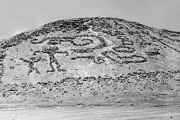Viewings: 5008

On different continents scientists find giant ancient images of animals, people, geometrical figures. For what purpose they were created? Answers to this question a lot, sometimes the most fantastic...
However, the true value of the mysterious drawings nobody knows.
It seems that the most prolific ancient artists were Indians - desert Attacks on the Pacific coast in the Northern part of Chile is rich in such pictures. The most interesting of them are the Nazca on the hill units between the towns of Tarapaca and Guara. There, for example, you can see you the figure of the wizard with a hexagonal head, crowned by a kind of a crown with 4 feathers. Sun connection and possession of secret knowledge symbolize 8 parallel lines from his temples and cheeks, a hatchet in his left hand and a musical instrument in the right. On the Western slope of the hill shows another sorcerer, who in his left hand holds a hatchet, and right pointing North. At his left side is clearly visible giant lizard. Other figures on Unicase represent rectangular people with large heads, one of which has something like elephant trunk.
The geoglyphs in the Atacama
In the decorated in Atacama hill, in the countryside outside Pintados, 6 km from the village of the same name, is depicted not only people in hats, birds and lamas, and rectangles, squares, rhombuses, circles, semi-circles, arrows, and Maltese crosses.
In other parts of the Atacama erosion that severely damaged the upper soil layers, however, failed to destroy these ancient drawings. In Alto Barranco you can see herds of llamas with shepherds, and in Alto Gwanilo - diamonds and the bird with extended wings.
As noted by the expert Chilean Nazca Hans Niemeyer Fernandes, they are made in two ways. Bright lines are the traces of remote top, darkened from oxidation layer of gravel and dark - laid light on the slopes of the rocks.
Archaeologists, ethnographers and experts in occult Sciences believe that the pictures are a totems of the local Indians, hoping for a good harvest and good hunting. The sheer size were to increase force of impact, and the geometric shapes, may symbolize used in magic crystals. There is another hypothesis: the Nazca can be a form of records of astronomical phenomena.
One of the most amazing pictures on the surface of the earth is a giant Trident topped with images of people and animals, called "chandelier of Paracas". He from time immemorial decorates facing the sea, sandy slope of the Peninsula of Paracas 300 km from the capital of Peru. The Central stem of a Trident - furrow length 500 m and a width of 4.5 m and a depth of 60 cm lateral branches is smaller and shorter. About the miracle that had been mentioned in Paracas in the XV century conquistadors. The figure has remained intact thanks to the unusual properties of the sand, the smallest particles of which don't move even in strong wind.
And what left us North American Indians? In 1923 Jerry Phillips, retired Colonel of the US air force, discovered from the air in the basin of the Colorado river huge image of man and the unknown animal with a long tail. In 1970 archaeologists Jay background Werlhof and Harry Kyoshi counted in the area of 275 geoglyphs, the most famous of which is otrova human figure, a circle with a diameter of 43 m and likeness Cougars length 11 m Scientists believe that these drawings Indians have created for their religious ceremonies. But how then to explain found in Ohio large image of a snake and eggs, in European culture is considered a symbol of alchemy, which American Indians never dabbled?
The love to painting was characteristic of the inhabitants of the Old world, especially the inhabitants of the British Isles. Northern slope of the hill in Wilmington, close to the English channel, is decorated with a silhouette "Long man" growth 70 m holding in each hand a thin stick. What he means is unclear, and the age of the image is estimated in 2-2,5 thousand years. Apparently, at the same time there appeared a giant and Chamois Abbas-in Dorset is inscribed in the Pentagon of a naked man with a baton in his right hand, considered the ancient Celtic symbol of fertility.
Many of the slopes of a limestone hills adorned with figures of horses, which was worshipped by the ancient Celts. The most famous image in length 111 m is Uffington near Oxford, and in Westbury once boasted a horse with a long, bent in a semicircle body and a huge eye, but... in the XVIII century the ancient Nazca disappeared, and in its place there was another white horse in a completely naturalistic style.
The abundance of Garipov found in all corners of the Earth, suggests that many mighty and mysterious images hidden under the grass and other plants. Maybe abiding fashion on their creation and brought to life the current multicolor graffiti? We see them today almost on every wall, and to the uninitiated, they seem so mysterious and incomprehensible, as huge figures on the earth's surface.
















